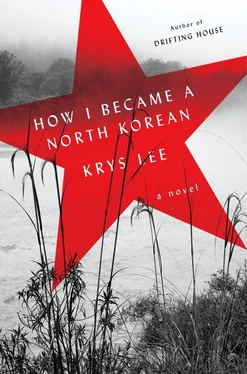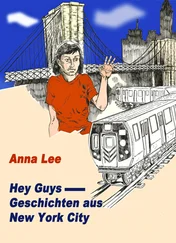I haven’t found them yet, though I did meet one woman who described my dongsaeng perfectly; the woman had been married off to a farmer, then fled the village during a crackdown. I did not give up. I tried dating strangers who remained strangers. And I did find the public housing apartment unit assigned to Jangmi. Two years passed before I dared write to her the first letter, then the second. A third. When she doesn’t respond, I understand. Sometimes the memory is as much as you can bear.
On Saturday I enter the empty church and slide onto a darkly stained pew as I often do, and force myself to return to the border that haunts my sleep. I return to Missionary Kwon, his image burning into my sight. To the Dear Leader, crossing borders in a green Soviet train with its curtains lowered so that no one can see in or out. To signboards of blood-red Chinese characters. To boys living in a cave, so gaunt that their cheekbones strain out of their skin. To the gun aimed at my abeoji ’s heart. To the last sight of the women in my life. I carry my other countries inside me.
As I wait for the bus back home to Kunsan, Seoul’s Saturday night crowd is awakening. Teenagers dressed like American rap singers pass, the girls with the same reproduced narrow, tilted-up nose, flaunting skirts that are more slips of fabric than clothes, flash the logos once coveted by my eomeoni ’s peers. A middle-aged woman waits in a ruffled miniskirt, as if she couldn’t bear parting with an image of her twenty-year-old self. The café in front of the stop is lined with books, its ceiling as high as a church steeple. You could buy a kilo of rice back home for the price of an Americano. I am often bitter; I am always nostalgic.
I find Jangmi’s letter in my neglected mailbox. The plain white envelope is the sort sold in twenty-four-hour convenience stores, and my address, a smudge of blue ink, as if she half-hoped that I would not receive it.
In the apartment nearly as empty of possessions as the day I moved in, I wait as long as I can bear. I open the window and let in the early spring air, face its chilly fingers and try to stay calm. It might be a cursory note directing me to never write to her again. A colorful declaration of disgust at my epistolary rituals. She might mock my certainty that she is the only woman who can ever really know me, brand me as a man stuck reading the past. Which I am. My hands shake as I cajole the envelope open, careful not to rip it.
The letter is sent, and it’s too late to take it back. I realize what this means as I sink into the largest tub in the bathhouse. I press against a shooting jet of water, its force compounding the pounding of my heart. The bubbling water swells up my nose. I proposed the meeting in a weak moment, but I don’t have to show up. I can leave Yongju alone waiting on the beach in front of the Paradise Hotel to watch the sunrise by himself.
It won’t be a completely wasted trip to Pusan for him; there is the fish market, the beach boardwalk. The Pusan film festival exhibition hall to visit. I stay in the steaming water and watch the naked bodies of women surrounding me. They are dragged down by hanging breasts and wide thighs wrinkled like tissue paper. Weary bodies, my eomma ’s body, the kind of body that will someday be mine. I decide I will arrange another phone call to her that week, no matter what it costs to pay the broker. For there is a broker for everything north and south of the thirty-eighth parallel. A thriving industry has grown up around us.
I plunge into the cold pool then back to the hot, going from scalding to frozen, trying to distract myself. As I cross back to the cold pool, a halmeoni with thready gray hair and a bulbous stomach pinches my butt cheek as if my body is hers and says, “If you young ones had gone through the postwar years you wouldn’t be skimping! You’d know the value of food.”
I have known all kinds of hunger, but I am tired of fighting. In my best standardized South Korean accent I just say, “Halmeoni, you must have had a hard life.”
In the steaming room I listen patiently as she begins sharing the stories she must have needed to tell.
• • •
I once saw a person swept under the Tumen River’s summer currents. I got a single look at him before the square-jawed man sank into the swollen river. It happened years ago, but in Pusan his body returns to me in dreams. I see his hands reaching for anything to hold on to and his fingernails catching and tearing on an azalea bush. His brown face bobs up, down, and his wide-open mouth floods with water. His body floats downstream until his foot lodges between two rocks and his limbs fan out like kelp. Only then do I turn his body over and see Missionary Kwon.
The day I’m to meet Yongju, I wake up early. The missionary’s sightless eye hovers outside the window where the moon should be. My breath draws sharply in. It’s just an image, I tell myself. An image that sometimes compels me to church. The past, my unborn infant, is always with me. I force myself to get up. The common room is weighed down with objects as if I have lived there for decades. Nothing useful escapes me: bundles of old cooking magazines, tossed-out construction gloves, abandoned bookshelves and chairs, orphaned buttons and safety pins, a straw basket choking with coupons. Between full-time work as a receptionist and night school, I rip through charity shops, looking for bargains that don’t look like bargains. My apartment empty of people, the way I wanted it.
It is possible to live happily forever alone. That is what I told myself. Still, I take care before I leave the apartment early in the morning, applying makeup, curling my hair. I pass stores with their metal shutters pulled down and wait for the bus toward Haeundae Beach. I whirl around at footsteps behind me, but there is no one there.
The only people out near Haeundae are drunk, sleeping men, couples, and a few hostess-room girls returning home in tight black dresses and fur coats. I blush just looking at them, but their smoky eye shadow makes me wonder if the blue I usually apply marks me as old-fashioned or worse, from the North, like my accent that reappears in traces and words from home that sometimes tumble from my lips. There is my bad leg that has never quite healed, which drags a beat behind the rest of me.
The shore is as grainy as sandpaper on my bare feet, but it feels good to walk. Here I am, living in a port city, and six months have passed since I visited the beach. A wave hits the shore, then a larger one collides into it and swallows it up. I wade knee-deep in the freezing water, my bare feet clammy with salt and sand. My cardigan ripples around me; my hair tangles in the salty air. I feel lighter than I have in years. I wonder if I will reach another reality if I keep walking.
Then I spot Yongju staring down at a crowd of hermit crabs scrambling near his feet. He hasn’t seen me yet, but it is as if he has touched me and awakened my sleepwalking body. He is wearing rumpled slacks, a white dress shirt, and a black wool coat as if for an interview, his silky hair blowing into his face. Though he has filled out from boy to man, a permanent storm of worry still creases his forehead. I see the gaps in him as plainly as missing front teeth. He has known and experienced too much, but still I want to walk, to run to him, toward my real life.
I take a step back.
“Nuna,” he says, looking up, the vowels in “Older Sister” made long and sinuous by his slow speech. “Jangmi.”
I want to run away as fast as my bad leg will let me, preserve the peace I’ve worked so hard to build. Looking at him, my old fears flare up. My heart comes alive. Yongju is complication, a wound ripped open. He’s a student, a North Korean with little to offer. I know there are no happy endings. But I don’t run. This time I stay.
Читать дальше












